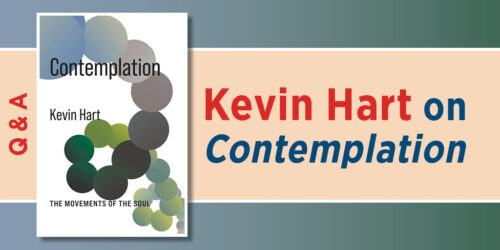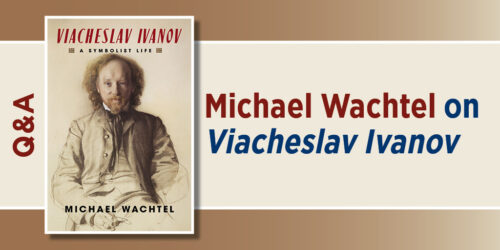Salman Rushdie on the Role of Religion in Literature and the Literary Imagination
Below is an excerpt from an edited transcript from the public discussion Salman Rushdie had with Gauri Viswanathan. The full transcript was recently published in the new book Boundaries of Toleration, edited by Alfred Stepan and Charles Taylor as part of our series, Religion, Culture, and Public Life. You can read more of the conversation here.
Gauri Viswanthan: Let me begin by asking a simple question, not about religion and the imagination, the title of this session, but about religion as imagination. If, as could be argued, conceptualizing an unseen power inherently involves human imaginings of the divine, what does the literary imagination add? Or what work does it do that is different from the religious imagination? Do you see yourself trying to recover, through literature, the impulses of a religious imagination before it freezes into theology, before experience turns into a theological, ethical construct?
Salman Rushdie: Well, the first thing to say is that all literature began as sacred literature. That is to say, the beginnings of writings are religious, that the oldest written material that we have is all the product of one or another religious experience. It’s a long time, if you look at the history of literature, before literature separates itself from that articulation of religion. So there is something profound in the origins that link them.
The other thing is that religious language has had such a powerful effect, I think, on all of us, whether we are religious or not, that there aren’t words to express some things except religious words. For instance, if you think about a word like the soul, what does that mean if you are not a religious person? I don’t believe in an afterlife or a heaven or a hell and so on, and yet I feel that when I use that word it has some meaning. What could that meaning possibly be? There isn’t a secular word for that feeling that we are not only flesh and blood, that there is, as Arthur Koestler, said “a ghost in the machine.” Whether you are religious or not, you feel obliged to use language that has been shaped by religion in order to express things that may not have a religious purpose. So that’s a constant battle. But I think you are right to say that I’m not interested in devotion, and in that sense I’m not interested in writing books that express anything other than interhuman devotion, which is temporary.
Viswanathan: At the same time, I’ve read several writings of yours where you talk about both the beauty and the terror of religion, the ability of religion to inspire profound feelings of great beauty and majesty as well as to incite great bloodshed.
Rushdie: Yes, I was being polite.
Viswanathan: But I remember that you wrote this very evocative passage—I think this was when you were in King’s College. You had gone to give a talk and you spoke about the architecture . . .
Rushdie: Yes, that’s true. You know, I grew up as a student looking out of my window at King’s College chapel, and it’s hard not to believe in the capacity of religion to create beauty when King’s College chapel is outside your window, this exquisite thing. Then I was asked to speak there, and one of the things that I thought would never happen to me in my life is that I would deliver the sermon in King’s College chapel. There are moments when your life surprises you.
And I have to tell you, apropos of nothing, I learned from doing that why priests speak the way they do. It’s because of the echo. They said to me, “You know, it’s ninety-two feet high, it’s stone, there is no carpet, and if you speak in an ordinary speaking voice then your echo comes back at you and no one can hear a word you are saying.” And—so you have to—speak—like this. You have to say—what you have to say—in this way. And suddenly you understand how preachers do it, and it’s because of the echo. There is a metaphor lurking in there somewhere.
Viswanathan: So do you see something about aesthetics that does have that religious sensibility?
Rushdie: Yes, what I’m saying is, I think there are different ways of getting there. It’s quite clear that religion has inspired people to create things of incredible beauty and also that people of no religion have created things of incredible beauty. So there is nothing intrinsic about religion that makes it the way of getting there, but it is a way of getting there. I think it’s true that you can listen to great religious music, for example, you can look at icon painting, you can read Milton or Blake, and you can easily see the power of religious belief to create or to help to create beauty. And for me the great, the most useful thing has been the power of religion to create very strong metaphors. I’ve gone back often to what I call dead religions, what’s more commonly called mythology. But remember that the great Greek myths were once the religion of Greece, and Roman mythology was once the religion of Rome. It had all the apparatus of priests and anathemas and so on to defend it. Now that it doesn’t have that, we can simply look at it as text and, of course, you find in these stories astonishing amounts of meaning compressed into very, very small amounts of words.
When I was writing The Ground Beneath Her Feet, for example, I was studying the Orpheus myth. Now, you can express the whole story of Orpheus and Eurydice in less then one hundred words. It doesn’t really require more than five or six, what, ten sentences maybe, and yet the amount of complexity pushed into that very small story is almost inexhaustible. You have this very complex examination of the relationship between love, art, and death, and you can turn it this way and that way. You can say that this story tells us—shows us—the power of art inspired by love to overcome death. Or, if you are feeling more pessimistic, it can show us the power of death to destroy love, even when love is guided by art.
There isn’t a single reading; there are many readings. That’s something that living religions also have in common. There is not a single way of reading the text; there are very rich and complex ways of reading these texts. If you’re in the text business, you’re very interested to see how much power can be concentrated in how little in these ancient works. So it’s been very important for me to examine that.
Viswanathan: In fact, The Ground Beneath Her Feet is the novel I wanted to talk about a little bit. You have pairs of contrasting characters in this novel such as the ultrarationalist Sir Darius and the miracle-chasing wife, Lady Spenta. For Sir Darius, every intellectual effort begins with the death of the gods, and he seeks out a secular origin prior to all religion, whereas his wife searches for enchantment. And in The Enchantress of Florence, your most recent novel, you have Akbar as a modern man who questions the existence of God and presides over spirited debates in the tent of the new worship between competing philosophical schools. Yet the same rationalist skeptic has created his imaginary Queen Jodha, and he lives in a world steeped in magic and miracles. So I wanted to ask you how you reconcile these two images cohabiting the same world, these super-rationalist figures who are highly skeptical and who privilege human effort over religion and yet, at the same time, are encompassed by this world of miracles and magic.
Rushdie: Yes, I don’t reconcile them. That’s the thing: I just allow them go on arguing inside me as well as outside. It’s true that if you are involved in the making of imaginative writing there is a powerful argument implicit in what you are doing against pure rationalism, because what you are doing often is not reasonable. The way in which a story is created or an imaginative piece comes to life, there is a mystery in it, and you can’t deny that is so. There is a bit of me—I guess the bit of me that is sitting here—that is quite rationalistic. I would argue, not unconventionally, that religion comes after reason and that, actually, religious texts were invented by people and that gods, indeed, were invented by human beings in order to answer the two great questions of life, “Where do we come from?” and “How should we live?” It seems as if every religion is based on an attempt to answer those questions, the question of origin and the question of ethics.
I would say, and I have often said, that I don’t need religion to answer either of those questions. Because, on the question of origins, the one thing you can say about every religion ever invented is that they are wrong. The world was not created in six days by a sky god who rested on the seventh; the world was not created by the churning of primal material in a giant pot; the world was not created by the sparks unleashed by the friction of the udders of a gigantic cow against the boulders of a bottomless chasm. All these things might be pretty, but they are not true. And so it seems to me that religion just has nothing to say on the question of origins. And on the question on ethics, it seems to me that whenever religion has got into the driving seat on that question, what happens is inquisition and oppression.
So it seems to me not just uninteresting, but not valuable to turn to religion. I don’t want the answers to come from some priest. I would prefer them to come from this, from the process of debate and argument and the kind of thing for which this institute has been set up. Actually, the first thing you accept in that situation is that there are no answers. There isn’t an answer; there is only the debate. The debate itself is the thing from which flows the ethical life. So that is what I would say, and that is what I think. But when I’m writing, something weird happens, and the result is these books, which clearly do contain a large amount of what you would call supernaturalism. I find that as a writer I need that in order to explain the world I am writing about. As a person I don’t need it, but as a writer I do. So that tension is just there. I can’t reconcile it, it is just so.





